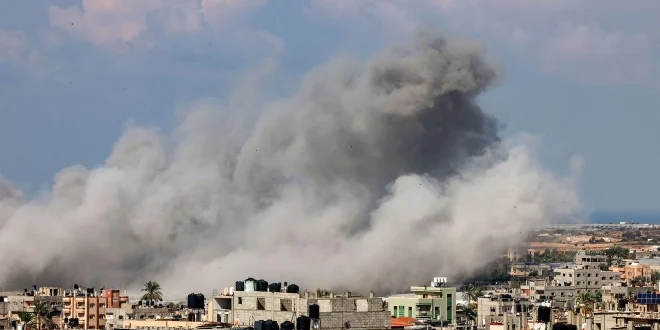On Thursday, Israel conducted airstrikes on Gaza as tensions with the U.S. intensified over American calls for restraint from its ally. This action coincided with the expected arrival in Jerusalem of a top White House advisor.
The conflict, now entering its third month, was triggered by an October 7 attack by Hamas, which Israeli officials report resulted in the deaths of 1,200 people. The ongoing war has devastated Gaza, leading to over 18,600 fatalities, predominantly women and children.
The Israeli airstrikes early Thursday resulted in at least 19 deaths across Gaza. In the West Bank, particularly in Jenin, the Palestinian Authority reported two deaths due to Israeli strikes.
U.S. President Joe Biden, while supporting Israel with military aid, criticized Israel’s “indiscriminate bombing” in Gaza, indicating a weakening of international backing. Israeli Prime Minister Benjamin Netanyahu, however, remained steadfast in his military campaign, declaring his intention to pursue victory.
Foreign Minister Eli Cohen echoed this sentiment, stating the war against Hamas would continue irrespective of international support.
Jake Sullivan, U.S. National Security Advisor, was scheduled for discussions with Netanyahu and his cabinet. His agenda included advocating for a de-escalation and exploring a timeline to conclude the war.
The U.S. National Security Council’s spokesman, John Kirby, anticipated these discussions to be “extremely serious.”
Divergences between Israel and the U.S. also extend to post-conflict governance in Gaza. Hamas leader Ismail Haniyeh emphasized that any arrangements excluding Hamas or resistance factions would be unrealistic. He expressed willingness for dialogue towards establishing a Palestinian state with Jerusalem as its capital.
A poll by the Palestinian Centre for Policy and Survey Research revealed an increase in Haniyeh’s popularity following the war.
The international community, including the U.N. General Assembly, is increasingly calling for a ceasefire. The U.N. resolution for a ceasefire, despite being non-binding and opposed by the U.S., garnered significant support.
Reports from U.S. intelligence highlighted the use of unguided munitions by Israel, raising concerns about civilian safety in Gaza. Philippe Lazzarini, head of the U.N. agency for Palestinian refugees, described the current situation in Gaza as its “darkest chapter.”
Gaza is grappling with displacement, inadequate shelter, and scarce resources, exacerbated by recent heavy rains. The health system is collapsing, with the spread of diseases intensifying and vaccine shortages for children.
Amidst these challenges, the Israeli army is facing pressure to minimize troop casualties and secure the release of hostages. The army has lost 115 soldiers since the ground assault began, and around 240 hostages were taken by Hamas during the October 7 attack.
The situation remains tense, with potential repercussions across the region, especially along the Israel-Lebanon border where Hezbollah is located. The U.S. and the U.K. have imposed further sanctions on Hamas, targeting officials involved in violent activities.


